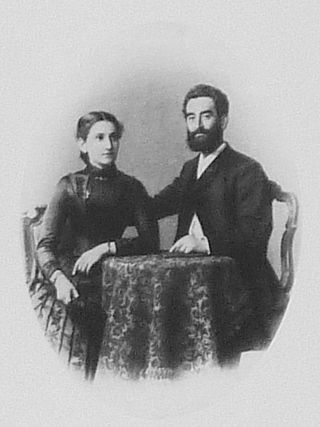Top Qs
Timeline
Chat
Perspective
Leonhard Tietz
German entrepreneur and art collector (1849-1914) From Wikipedia, the free encyclopedia
Remove ads
Leonhard Tietz (March 3 1849 - November 14 1914) was a German department store entrepreneur and art collector of Jewish origin.[1]
This article needs additional citations for verification. (July 2022) |

Biography
Born in Birnbaum an der Warthe, Province of Posen, Prussia (today Międzychód, Poland), Leonhard Tietz was the brother of Oskar Tietz and a founding member of the Tietz Department store dynasty. On 14 August 1879, he opened his first department store in Stralsund, with the idea of selling high-quality products at fixed prices for cash.[2] He was the first to introduce a money-back guarantee. In 1891, a shop was opened in Cologne.[citation needed] In 1905, his enterprise was transformed into a joint stock company.[3]

The Warenhaus Tietz at the Königsallee in Düsseldorf was entirely designed by Art Nouveau protagonist Joseph Maria Olbrich and opened in 1908.[4] For the Tietz Department Store in Wuppertal Elberfeld Wilhelm Kreis was hired (1910–11), [5] who also was the architect for their new building in Cologne (at the corner of Hohe Straße and Gürzenichstrasse, 1912–14).


Remove ads
Art collector
Tietz owned an art collection[6] which included paintings by Vincent van Gogh and Paul Cézanne. In 1912 he lent a self portrait by van Gogh and a still-life by Cézanne ("Früchte mit Glas und Porzellanschale") to the famous Sonderbund Exhibition in Cologne (Internationale Kunstausstellung des Sonderbundes Westdeutscher Kunstfreunde und Künstler zu Cöln).[7]
Legacy and loss
After Tietz's death, his son Alfred Leonhard Tietz led the Tietz firm. In 1933, the Nazi Party came to power in Germany and Jewish businesses were targeted.[8] The Nazi policy of racial discrimination and anti-semitic harassment of Jewish-managed firms hurt the Tietzs' department store and other businesses.[9] The business was renamed Westdeutsche Kaufhof AG. In an "Aryanisation" (the obligatory transfer of Jewish businesses to non-Jewish owners),[10][11] the Tietz family was forced to sell their shares under market value. They fled Nazi Germany. After the Allied victory, they received some compensation estimated at 5 million DM.[12]
Today, the department store chain Galeria Kaufhof is the descendant of the tiny shop opened in 1879.[12]
See also
References
External links
Wikiwand - on
Seamless Wikipedia browsing. On steroids.
Remove ads
